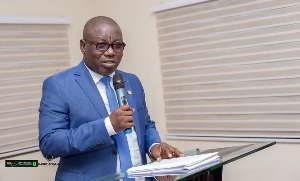Accra, March 10, GNA - A four-day ECOWAS Parliamentary Committee Meeting opened in Accra with a call on the sub-regional leaders to join the numeric Information, Communication and Technology (ICT) revolution.
It was on the theme: "Introduction of New Information and Communication in the System of Education; Challenges and Perspectives." Topics being discussed comprised; "The new perspectives of ICT in the education sector (e-learning)", "Consideration and adoption of the draft agenda on ICT and "draft work programme.
Mr Ousmane Mahamane, Speaker of the ECOWAS Parliament and former President of
Niger who opened the meeting said the 21 century was marked by development in ICT. He noted that humanity and advancement of nations depends on access to ICT, which
are essential tools for access to knowledge and a keystone for sustainable economic and
social development. Mr Mahamane said maximal and efficient use of ICT was the established rule for teaching and asked schools in the sub-region to be enthusiastic in developing information technology.
He observed that Uganda, Morocco, Tunisia and South Africa are the countries in Africa where ICT is well integrated into their educational systems. "What is our sub- region waiting for to join this numeric revolution, which is
progressing at an exponential speed? What are the challenges and perspectives for our community?" he asked.
Mr Mahamane said delay in the implementation of the real ICT integration policy in school curricula, absence of appropriate structures for co-ordinating all computer initiatives, failure to use the numerous computer rooms for teaching and didactive purposes due to lack of adapted programmes and the absence of education software's with direct links to class activities and especially appropriate training for teachers were hindering the adoption of ICT in the schools. He said the involvement of the community Parliament could help speed up the
ineluctable process. Dr Adriene Yande Diop, Commissioner for Human Development and Gender said the
meeting was in consonance with the ECOWAS Commission's e-learning initiative which
has been pursued with vigour as a priority since 2004. She said e-learning was strategically positioned to improve access to education via
telecommunication infrastructure over a large geographical area, at minimal additional
cost of teachers, classrooms, learning materials and other logistics. Dr Diop said though member states have made attempts to promote technology-
mediated learning, a lot deserves to be done, adding that ICT in education was faced with
the problem of internet bandwidth, energy, infrastructure, phobia of teachers in the use of
ICT and limited technical expertise. She said ICT in education was the antidote to the diverse challenges in education in the
region and should be tackled headlong by all stakeholders.
General News of Wednesday, 10 March 2010
Source: GNA












